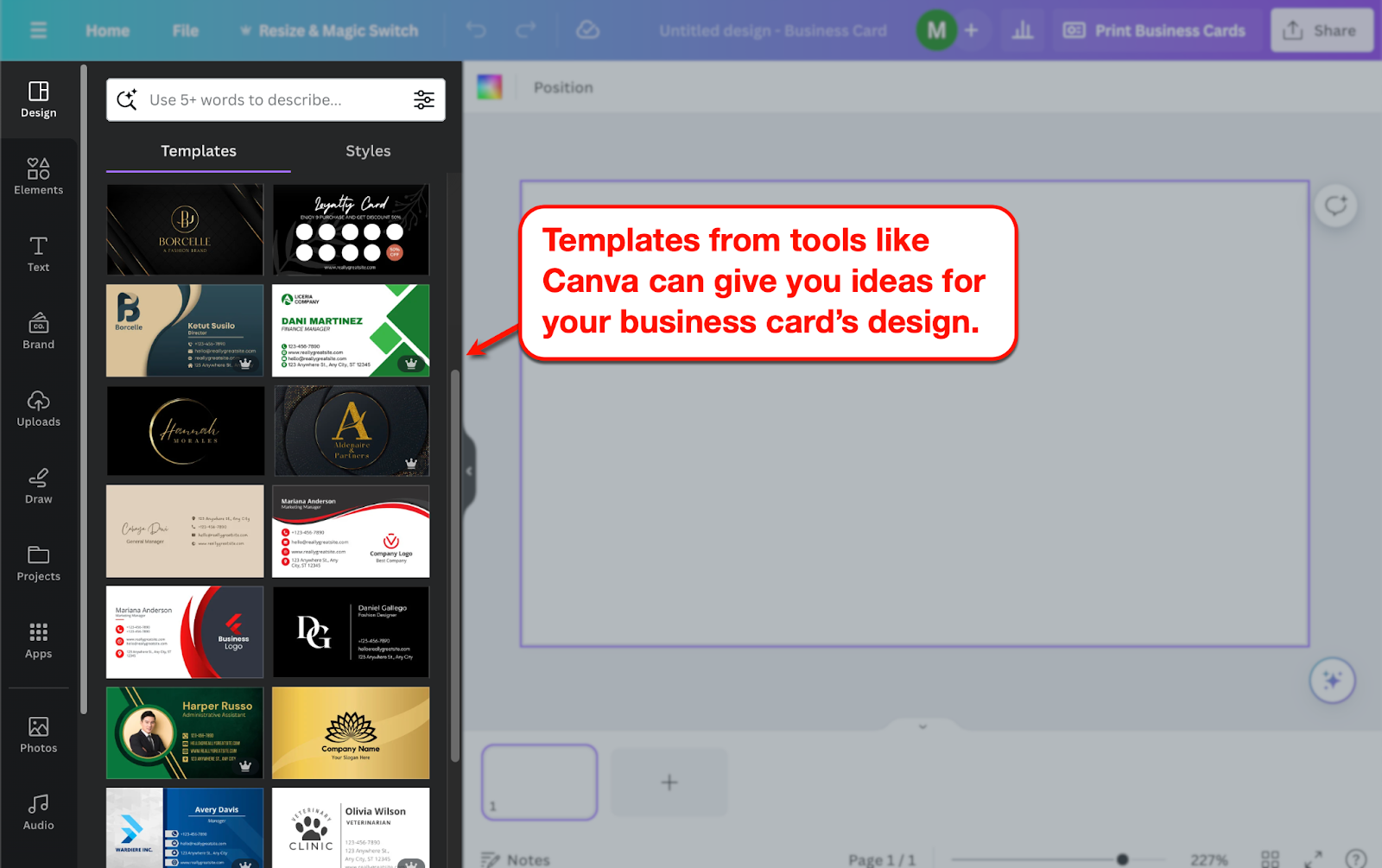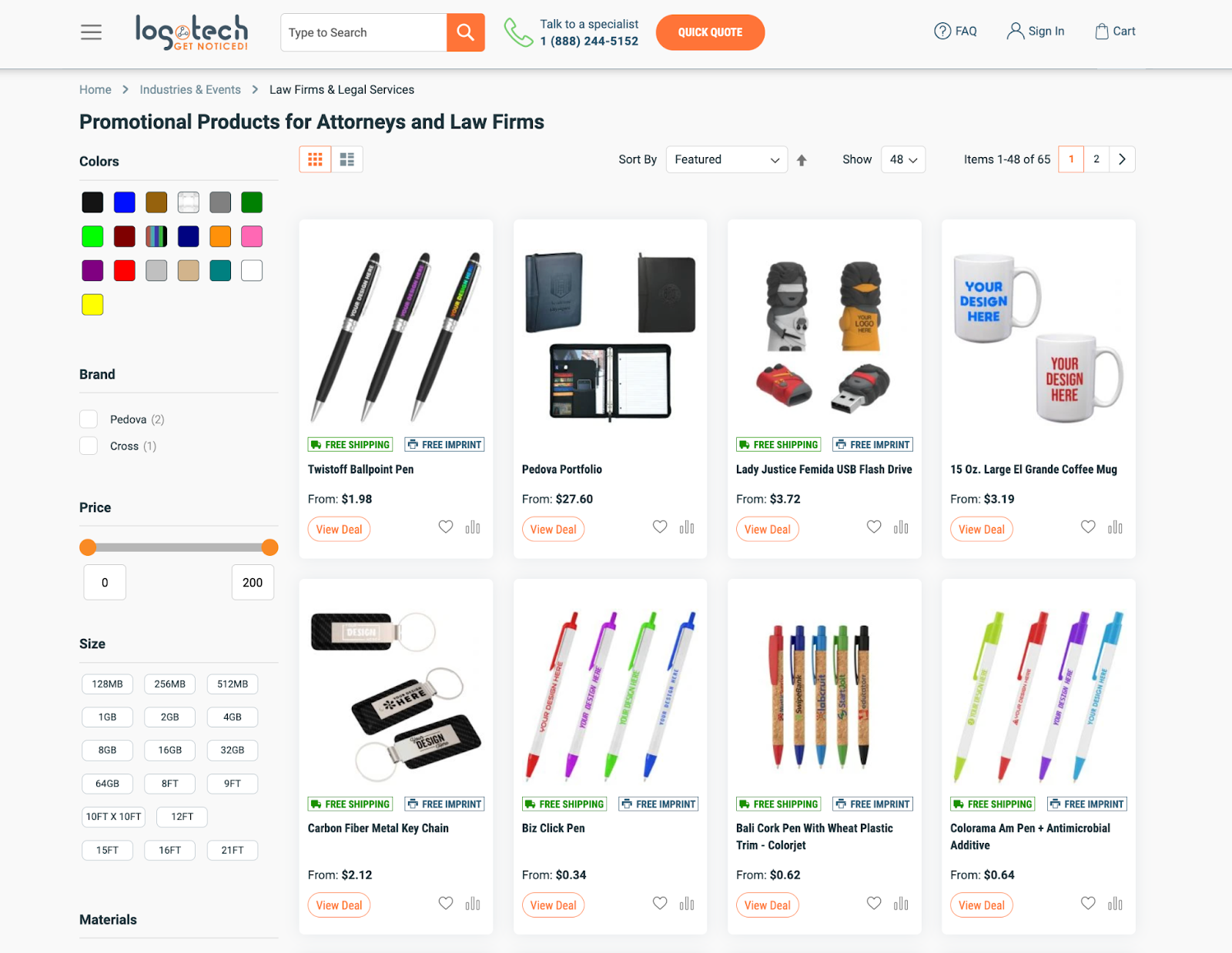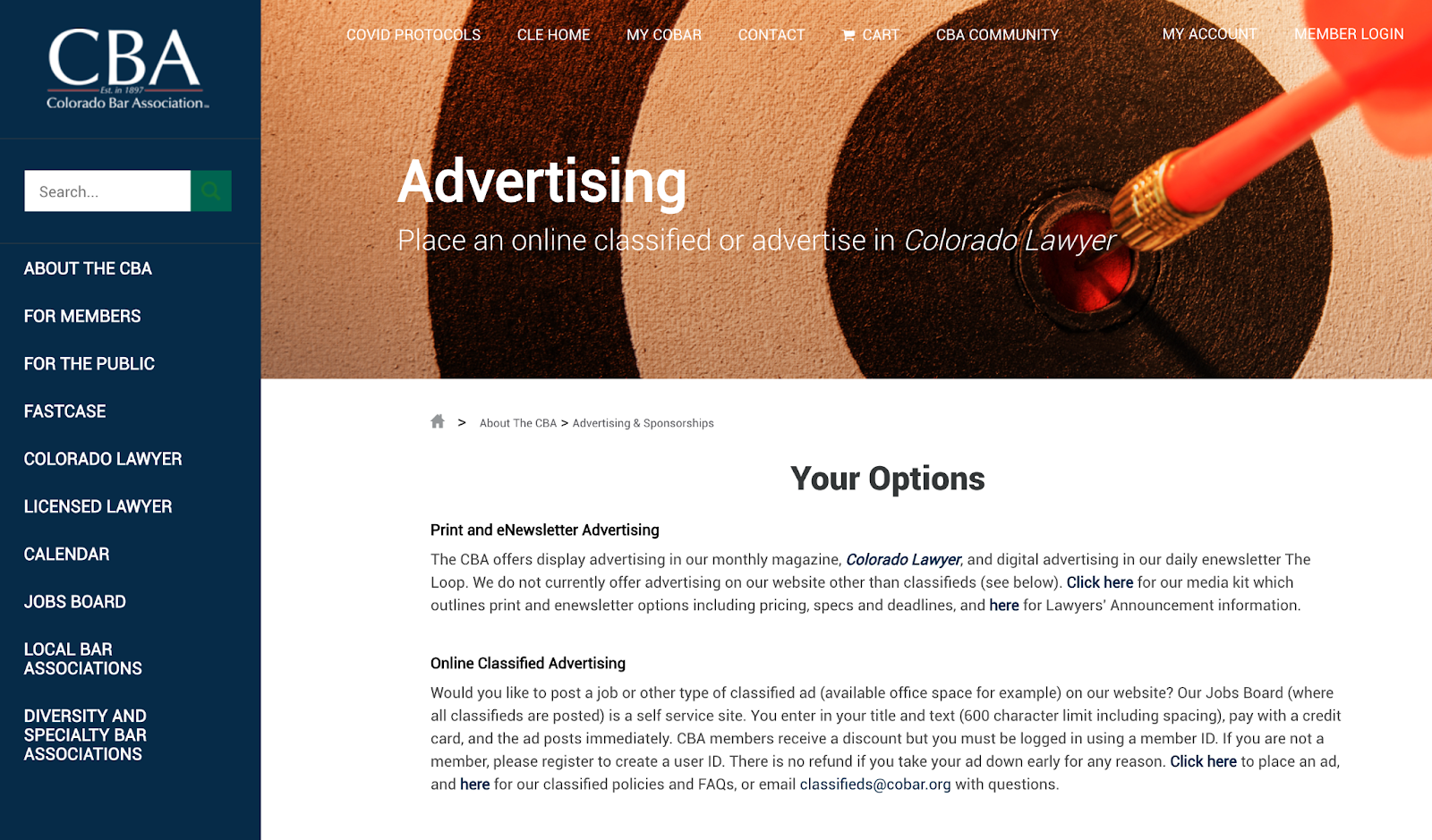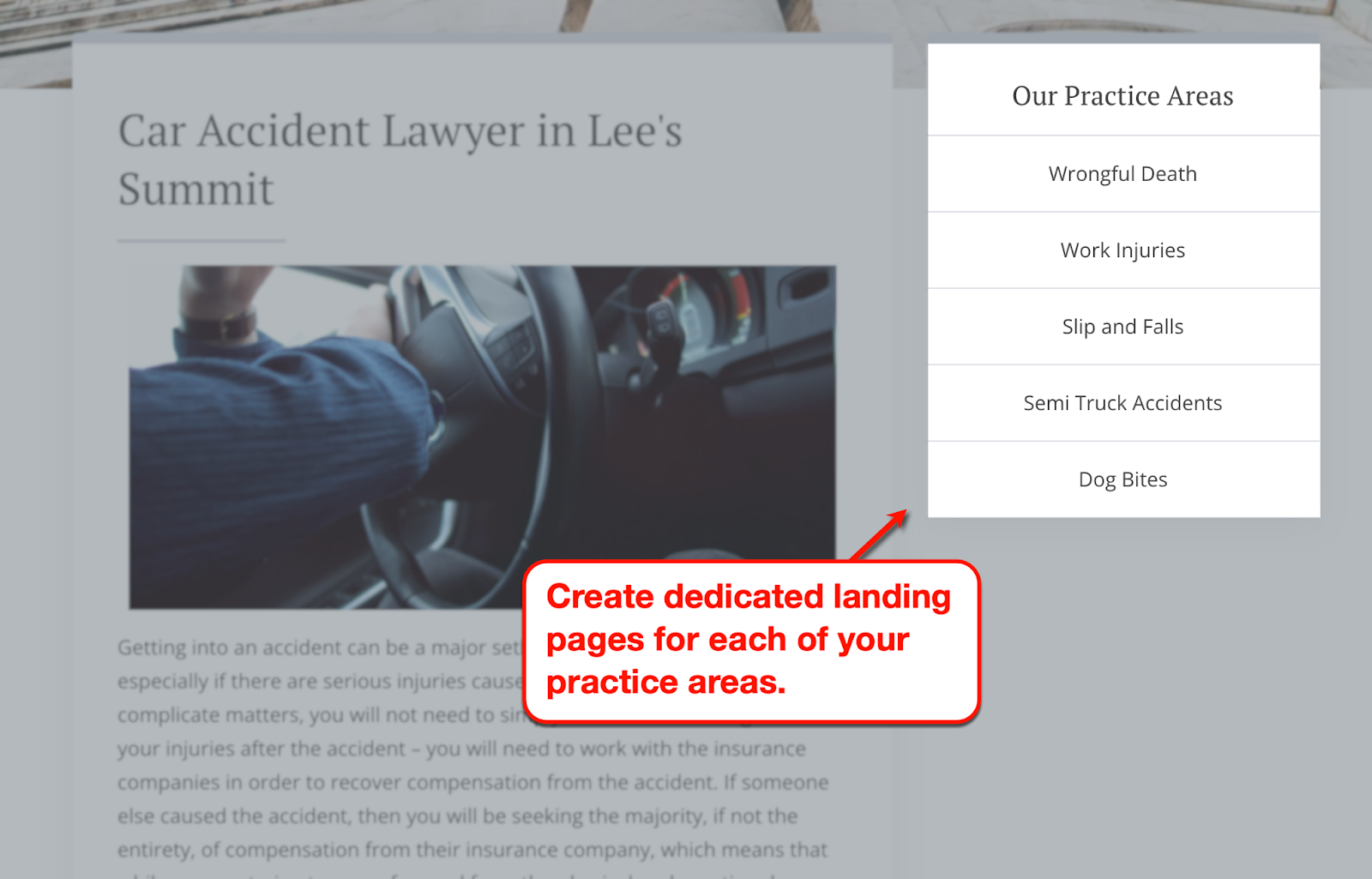Law Firm Marketing Materials You Need in 2025
Before creating marketing material, you need to go through a number of steps like defining your target audience, researching marketing channels, and consolidating everything into a documented marketing plan. And from there, it’s time to roll up your sleeves and get your content creation going.
Read on to learn the top 13 marketing material every law firm should have in their toolbox.
Or, go ahead and contact us here to let experts identify the ideal marketing strategies you should be using.
Traditional Law Firm Marketing Materials
Let’s kick things off with material used in traditional law firm marketing.
1. Business Cards
A business card is a staple even in today’s lawyer marketing strategies. They’re useful for fostering stronger relationships with potential clients, local business partners, and other attorneys in your professional network.
Whether you’re networking at a local event or meeting with prospects in public, a good business card helps you make an impactful first impression. It also makes it more convenient for contacts to reach you later on.
There’s a good chance you already have a business card in your wallet right now. If not, there are three things you need to get sorted before printing your first batch:
- The law firm’s logo. A logo can make or break a business card’s design. Feel free to reiterate your existing firm logo to make it more visually appealing on print.
- Your information. Apart from your name, your business card needs to include essential business information. Don’t forget your phone number, practice area, address, email, and social media handles.
- A tagline. Taglines in business cards fulfill various purposes — from simply reminding the holder about your services to convincing prospects to reach out. Keep it short, to-the-point, and aligned with your law firm’s value proposition.
When it comes to design, a practical approach is to hire a professional artist to create multiple mockups based on your preferences. You may also borrow ideas from templates offered by graphic design tools like Canva.

2. Custom Merchandise
People love freebies, even if they’re embellished with logos, business names, and other branding elements.
Not only do free products build loyalty, they also double as marketing tools that promote your firm wherever they’re used. That’s why you should offer merchandise that prospects or clients can utilize in their day-to-day.
Some examples of custom merchandise law firms can offer are:
- USB sticks
- Umbrellas
- Hand sanitizers
- Tumblers
- Journals and portfolios
- Ballpoint pens
- Coffee cups and mugs
If you don’t know a local supplier for these merchandise, check out directories like Distributor Central.
Or, use services like Logotech to handle everything in creating and delivering your legal promotional items.

3. Print Ads
Leveraging print ads is a proven way to get exposure to your target audience. You can get your ads on magazines, newspapers, brochures, trade publications, and flyers distributed over the local community.
If you plan to roll out lawyer advertising via existing publications, look for publishers that focus on topics relevant to the legal industry. Certain bar associations also publish magazines that accept print ad orders from local attorneys.
For example, the Colorado Bar Association helps promote print ads on their monthly magazine, Colorado Lawyer.

For your own bespoke print marketing materials, use directories like ThePrintGuide to find trusted printing companies in your state. Try to look at different multiple printing companies and compare their pros and cons to maximize your budget.
4. Direct Mail
Direct mail is a more direct and personal counterpart of lawyer print advertising.
Instead of printing ads on publications for unnamed strangers, mailers like postcards and letters are addressed to specific leads. This creates more personalized and compelling experiences that result in higher conversion rates.
According to the 2022 Response Rate Report by the Association of National Advertisers (ANA), direct mail has an ROI of 112%, whereas digital mediums like email and social media ads only have 93% and 81%, respectively.
Since direct mail marketing campaigns involve a lot of complexities, most law firms rely on marketing service providers like Postali to do the heavy lifting. These companies handle every step in the mailing process, including material quality assurance and same-day delivery to prospects who need your legal services.
5. Brochures
Brochures are like landing pages that address your target audience’s questions, explains their options, and encourages them to reach out to your firm — but in printed form.
Compared to other law firm marketing materials, brochures are the most dependent on expertly-crafted design and copywriting. As for distribution, they can be handed out during events or at your office.
Brochure printing services are widely available from companies like Staples. Design service providers like PaperStreet can also help law firms create engaging brochure designs that will get your message across to your target audience. If you want a DIY option, consider templates from Venngage.
6. Legal Portraits
Professional attorney headshots serve multiple purposes in a law firm’s marketing strategy. They can be featured in brochures, branded notebooks, postcards, emails, and all over online marketing channels.
Legal portraits are also a must in creating a law firm website that prospective clients can trust. You’ll need them for creating great attorney bios, your “About” page, and an eye-catching homepage that captures your audience’s interest.

Don’t hesitate to reach out to us about our lawyer photography services for quick, professional, and cost-effective results.
Digital Law Firm Marketing Materials
Creating digital marketing material frees you from the responsibilities of sourcing supplies and managing logistics. But it still involves just as much planning, content production, and optimization.
1. Your Website
If you want to grow your law firm’s online presence and reach, a professionally-designed website should be the first on your checklist.
As the digital extension of your office, your website should be equipped with everything potential clients need to do business with you. It should help them learn more about your legal services, get to know your attorneys, and get in touch with your team.

The good news is, launching a law firm website is easier and more affordable than ever. This is mostly because of site builders for lawyers that bring everything you need to create your website in one package, like hosting, domain registration, and page building.
Some of the best website builders for law firms are:
- Clio Grow
- WordPress
- SquareSpace
- Wix
- LawLytics
If you’d rather focus on your firm, you can outsource professional web design services to save time trying to figure out website development yourself.
2. Legal Blog Posts
Once you get your law firm website up and running, the next order of business is to deck it out with high-quality, informative blog posts. This helps to establish your expertise, earn the trust of your potential clients, and increase your website’s search engine rankings.
The number one rule is to create blog content based on your target audience’s pain points. Participate in social media groups, run surveys, and conduct keyword research to identify in-demand topics that people are searching for.
It’s also important to plan and organize your content into clusters. This means organizing related posts into categories and connecting them via internal links. Creating a category page or “pillar” page content also helps your audience and search engines discover relevant pages, which improves both the user experience and your website’s Search Engine Optimization (SEO).

Aside from writing about the right topics, make sure your legal blogging strategy checks the following boxes:
- Be mindful of your law firm SEO strategy. Use tools like Clearscope and Surfer to optimize each blog post around your target keywords.
- Document your content strategy. Consolidate your content plans into a single calendar or project management tool to keep your team in the loop, be it regarding deadlines, style guidelines, and resources.
- Analyze your competitors. Eliminate the guesswork by analyzing your competitor’s content and incorporating their top-performing ideas into your own strategy.
- Experiment with different content types. Explore formats like listicles, “how-to” guides, reviews, comparisons, and news-style articles to find out what works best for your firm.
3. Practice Area Landing Pages
Landing pages for law firms are specifically designed to persuade readers to take a single action. It can be to book a consultation, sign up for an event, download a report, subscribe to your newsletter, and so on.
There is, however, one type of landing page every law firm website should have.
Practice area landing pages are one-stop resources that accelerate your target audience’s decision-making process. They should assist potential clients through each step, such as learning more about your services, clarifying relevant terms, and proceeding with the next step.

To create great landing pages for your law firm, see to it that they include the following elements:
- Compelling headlines that address a problem.
- Mobile-responsive design.
- A single, clear Call-To-Action (CTA).
- Form fields that only request essential information.
- Results, testimonials, and other proof of your expertise from past and current clients.
4. Videos
Videos provide a lot of content marketing utility to law firms. They can be used on social media, landing pages, testimonials, blog posts, online courses, and dedicated video-sharing platforms like YouTube.
Whatever piece of content you’re working on, videos can elevate its value and user engagement factor.
According to the Video Marketing Statistics 2024 report by Wyzowl, 86% of marketers generated more traffic with video content. At the same time, 87% of video marketers were able to acquire more leads.

You just need to understand how video marketing for lawyers work and the best practices to make the most out of it.
Here are a few tips to get the ball rolling:
- Identify marketing goals that videos can help you with.
- Research your audience and competitors to fine-tune your video marketing strategy.
- Plot out the types of videos you need to create and the tools you need.
- Create a script or storyboard to ensure an engaging flow for your videos.
- Gather your video creation tools, resources, and references beforehand.
- Skip all the technicalities by hiring a video production company for attorneys.
5. Email Newsletters
Not all marketing materials are created to generate new leads. Newsletters, for instance, are meant to nurture and build the confidence of existing leads who already subscribed.
A newsletter helps rake in traffic to your website content. It can also help you bring more attention to virtually anything — be it an upcoming local event or newly-published case study.
To leverage newsletters in-house, invest in email marketing platforms like Constant Contact, GetResponse, Campaign Monitor, and Mailchimp. These come with useful features like templates, automation, list segmentation, and built-in analytics.
6. Ebooks
Speaking of newsletters, they only work if you already have a decent number of subscribers in your email list. And the best way to bring that number up is by offering gated content, like ebooks.
In simple terms, gated content is only accessible to those who provide their basic information, like their name and email address.
Don’t restrict yourself to just ebooks specifically about your practice areas. Van Horn Law Group, for instance, also publishes ebooks that tackle general topics that can help their target audience.

You can create ebooks from scratch with tools like Adobe InDesign and Canva. We also offer legal content writing services can have expert ebook writers build your material for you.
7. Social Media Content
Social media marketing content takes on many shapes and sizes. It depends on your target audience’s preferences, the social media platforms you’re publishing on, and your social media marketing goals.
Check out some of the top social media posts you can use for marketing:
- Short-form videos. Cover legal issues, news, trends, and snippets from interviews on TikTok, YouTube Shorts, or Instagram.
- Infographics. Visualize statistics and concepts relevant to your legal practice while making them more shareable.
- Photos. Give your audience a look at your company culture, event, or day-to-day activities to build trust.
- Regular posts. Use LinkedIn, Facebook, and X to promote blog posts to your followers.
Best Practices for Creating Law Firm Marketing Materials
Before we wrap up this post, here’s a quick rundown of the legal marketing best practices you should remember.
Develop a Marketing Plan
Craft a detailed marketing plan to identify the material you need and allocate your budget accordingly. Your law firm marketing plan will also help you track and evaluate results over time, which is crucial for improving your strategy and eventually hitting objectives.
Establish Your Unique Value Proposition
A unique value proposition or mission statement makes any marketing material more impactful and on-brand. It also solidifies your law firm’s identity, which is important for building your reputation, cultivating client loyalty, and converting leads into paying clients.
Measure The Effectiveness of Your Marketing Material
Use analytics tools like Google Analytics and TrackRight to monitor the performance of your marketing efforts. This is the key to making data-driven decisions that will help you get better marketing results.
Hire Lawyer Marketing Experts
Finally, remember that you can always hire digital marketing agencies to supply you with consistent, high-quality marketing material. A niche expert lawyer marketing agency can help you build a pipeline of high quality of leads that help you grow your business.
Contact us today for a free audit of your firm’s marketing footprint.
Table of Contents
Related Articles
Dominate Your Market with Digital Marketing Services That Deliver
Talk to a certified professional today, and we will design a strategy specific to your case.






